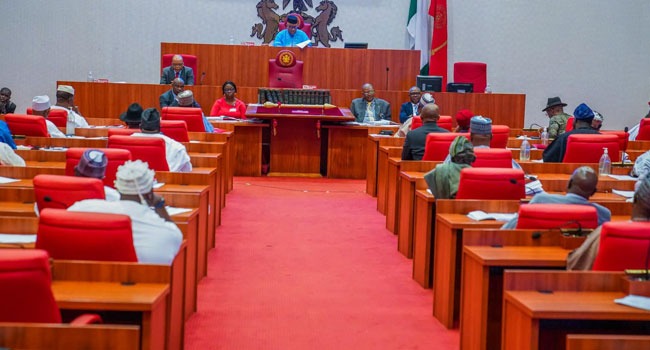N21m For Running Cost, Not Salary, Allowances – Senate Counters Kano Lawmaker
 Amidst claims and counter claims over the exact amount paid out to federal legislators as emoluments, the Senate has again refuted claims that Senators take home N21 million monthly.
Amidst claims and counter claims over the exact amount paid out to federal legislators as emoluments, the Senate has again refuted claims that Senators take home N21 million monthly.
Chairman of the Senate Committee on Media and Public Affairs, Yemi Adaramodu, in a statement on Thursday, said this clarification became necessary in the light of some misconceptions which trailed a recent interview granted to the BBC Hausa Service by Senator Kawu Sumaila (NNPP, Kano South).
Sumaila had in the said, interview which aired on Wednesday, claimed that as Senator, he takes home a cumulative N21 million monthly as salary and allowances.
He explained that his “monthly salary is less than N1million. After deductions, the figure comes down to a little over N600,000,”
The Kano State born Senator however, added that: “Given the increase effected, in the Senate, each Senator gets N21million every month as running cost.”
In response, the Senate Spokesman in his statement stressed that “running cost” was quite different from the salary and personal allowances of the lawmakers which he explained was fixed by the Revenue Mobilisation, Allocation and Fiscal Commission (RMAFC), the statutory agency empowered to fix salaries and allowances of elected public officers.
Recall the Chairman of RMAFC, Muhammed Bello, had on Tuesday, revealed that each Senator collects a monthly salary and allowances of the sum of N1,063,860:00.
Senator Adaramodu explained that the issue of running cost was not peculiar to the legislature because it was designed to cater for the effective running of their offices
According to him, “such funds are retired by relevant officers after being used for official purposes and proof of genuine expenditure.
“It’s not a personal allowance or salary of the legislator.”
He noted that for the sake of clarity, such funds were used for the maintenance of Constituency offices and staff.
Adaramodu expressed the Senate’s displeasure about the narrative that Senators were feeding fat on public funds.
He said, “The Nigerian Senate is an Assembly of accomplished and successful professionals, administrators and captains of industries, who are not driven by these often touted egregious pecuniary bits, rather for their patriotic zeal in the nation’s quest to breathe life to Nigeria’s political and socio-economic dry bones.”
The statement reads in part:”For the umpteen time, the Senate is compelled to react to the obsolete allegations of a phantom salary and personal emoluments spuriously credited to Senators monthly.
“The Revenue Mobilisation Fiscal Allocation Commission, the agency of government that fixes political officials’s salaries and allowances, has duly disclosed the monthly personal take-home of Senators.
“However, all arms of Government and their personnel, Governors, Ministers, Permanent Secretaries, Directors-General, State Commissioners, even Boards and parastatals including local government councils run their activities with running costs and the National Assembly is not an exemption.
“Thus the money referred to by Senator Kawu Sumaila is neither his salary nor personal allowance.
‘It’s for the daily running of offices by Senators and other attached statutory officials. It equally provides funds for Constituency office staff. It is also for oversight functions and community engagements.
“This funds are not static and it’s provided for in the annual budget. Such funds are retired by relevant officers after being used for official purposes and proof of genuine expenditure. It’s not a personal allowance or salary of the legislator.
“The National Assembly receives about 1% of the federal budget and has never exceeded this, even when the non-availability of funds is pervasive.
“The Nigerian Senate is an Assembly of accomplished and successful professionals, administrators and captains of industries, who are not driven by these often touted egregious pecuniary bits, rather for their patriotic zeal in the nation’s quest to breathe life to Nigeria’s political and socio-economic dry bones.”













